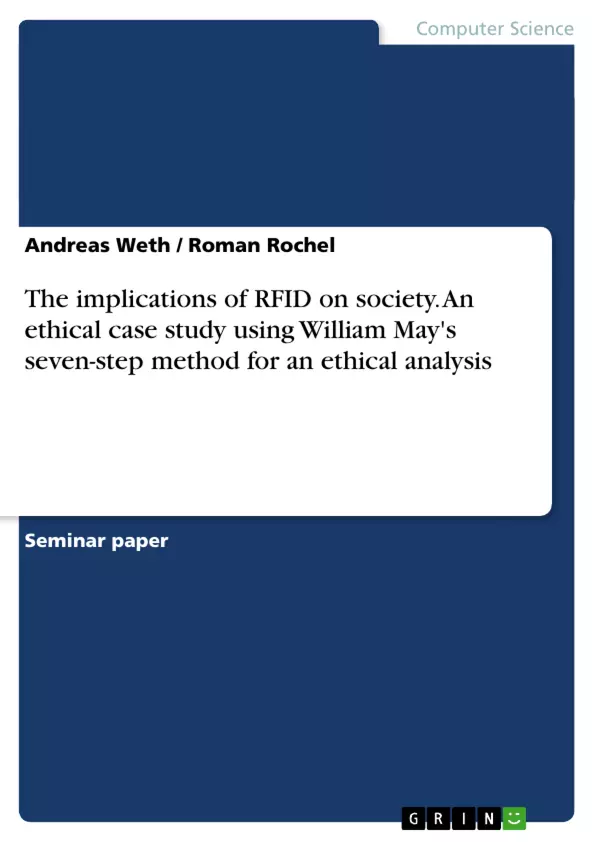This paper gives an overview over ethical risks in the field of Radio Frequency Identification (RFID). The William May method is used to develop the risk analysis for business ethics related issues.
Inhaltsverzeichnis (Table of Contents)
- Introduction
- Case Study
- Analysis
- The facts
- Ethical issues
- Major principles
- Alternative courses of action
- Comparison of values and alternatives
- Assessment of the consequences
- Finalizing a decision
- Conclusion
Zielsetzung und Themenschwerpunkte (Objectives and Key Themes)
This document presents a case study and evaluation of an ethical problem in the information technology environment. It focuses on the decision-making process faced by the Chief Information Officer (CIO) of a Mexican supermarket chain regarding the implementation of Radio Frequency Identification Technology (RFID). The case study examines the potential benefits and drawbacks of RFID implementation, including the ethical implications of selling customer data to a third-party marketing research company.
- Ethical considerations in business decision-making
- The impact of technology on customer privacy and data security
- The balance between cost reduction and ethical considerations
- The role of leadership in making responsible choices
- The potential benefits and drawbacks of RFID technology
Zusammenfassung der Kapitel (Chapter Summaries)
- Introduction: This chapter sets the stage for the case study, introducing the ethical dilemma faced by the CIO of Platano Supermercados. It outlines the context, the key players, and the potential consequences of the decision.
- Case Study: This chapter presents the specific scenario, detailing the lucrative offer from Delincuencia Marketing Services (DMS) and the CIO's motivation for considering it. It also provides background information on the company, the competitive landscape, and the CIO's personal background.
- Analysis: This chapter explores the ethical aspects of the decision problem. It examines the facts of the case, identifies ethical issues, and analyzes the major principles involved. It also presents alternative courses of action, compares their values, and assesses the potential consequences. The chapter culminates in a discussion of how to reach a final decision.
Schlüsselwörter (Keywords)
This case study explores key concepts related to ethical decision-making in the context of information technology implementation. Key terms include: RFID technology, customer privacy, data security, ethical dilemmas, cost-benefit analysis, and decision-making frameworks. The case study uses the seven-step method developed by William May to analyze the ethical dimensions of the decision.
Frequently Asked Questions
What is RFID technology?
Radio Frequency Identification (RFID) uses electromagnetic fields to automatically identify and track tags attached to objects, containing electronically stored information.
What are the ethical risks of RFID?
Key risks include threats to customer privacy, data security, and the potential for unauthorized tracking or profiling of individuals.
What is William May's seven-step method?
It is a framework for ethical analysis involving steps like identifying facts, ethical issues, major principles, and assessing the consequences of alternative actions.
Is it ethical to sell customer data to third parties?
The case study discusses the dilemma of a CIO balancing financial gain for the company versus the ethical responsibility to protect customer privacy.
How can companies implement RFID responsibly?
By ensuring transparency, obtaining customer consent, and implementing robust security measures to prevent data misuse.
- Quote paper
- Andreas Weth (Author), Roman Rochel (Author), 2004, The implications of RFID on society. An ethical case study using William May's seven-step method for an ethical analysis, Munich, GRIN Verlag, https://www.grin.com/document/35472



